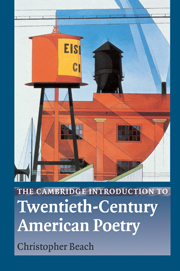Book contents
- Frontmatter
- Contents
- Introduction
- 1 A new century: from the genteel poets to Robinson and Frost
- 2 Modernist expatriates: Ezra Pound and T. S. Eliot
- 3 Lyric modernism: Wallace Stevens and Hart Crane
- 4 Gendered modernism
- 5 William Carlos Williams and the modernist American scene
- 6 From the Harlem Renaissance to the Black Arts movement
- 7 The New Criticism and poetic formalism
- 8 The confessional moment
- 9 Lyric as meditation
- 10 The New American Poetry and the postmodern avant-garde
- Notes
- Glossary
- Index
2 - Modernist expatriates: Ezra Pound and T. S. Eliot
Published online by Cambridge University Press: 05 June 2012
- Frontmatter
- Contents
- Introduction
- 1 A new century: from the genteel poets to Robinson and Frost
- 2 Modernist expatriates: Ezra Pound and T. S. Eliot
- 3 Lyric modernism: Wallace Stevens and Hart Crane
- 4 Gendered modernism
- 5 William Carlos Williams and the modernist American scene
- 6 From the Harlem Renaissance to the Black Arts movement
- 7 The New Criticism and poetic formalism
- 8 The confessional moment
- 9 Lyric as meditation
- 10 The New American Poetry and the postmodern avant-garde
- Notes
- Glossary
- Index
Summary
The poetry of Robinson and Frost suggested one possible direction for American poets in the twentieth century: a reworking of traditional lyric forms that would require no radical break from nineteenth-century poetic convention. In the eyes of some modern poets, however, the work of Frost and Robinson did not go far enough in the direction of a stylistic, formal, or conceptual breakthrough. Poets who participated in the poetic avant-garde of the 1910s and early 1920s, such as Ezra Pound, William Carlos Williams, T. S. Eliot, and Marianne Moore, saw the poetry of Robinson and Frost as merely continuing an outworn tradition of verse. For these self-declared “modernists,” poetry needed to undergo the same kind of transformative process that was taking place in the other arts: cubism and collage in painting, chromaticism and atonality in music, and functionalism in architecture. Further, poetry had to reflect the reality of a rapidly changing modern world, a world which the works of Frost and Robinson in large part ignored. Though Pound had been supportive of Frost's early work, by 1915 he had lost interest in the kind of poetry Frost was writing.
The world had indeed changed a great deal since the end of the nineteenth century. First of all, there was the new urban landscape and the increasing speed of communication and transportation. The construction of bridges, skyscrapers, and factories was radically altering the American landscape, while the radio, the telephone, the trolley, the subway train, and the automobile were transforming American life.
- Type
- Chapter
- Information
- Publisher: Cambridge University PressPrint publication year: 2003



